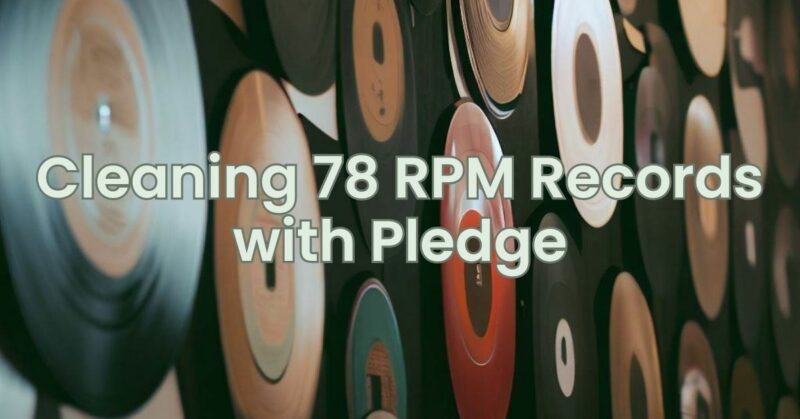Cleaning 78 RPM records is an essential part of preserving and enjoying these vintage musical treasures. While various cleaning methods and solutions are available, some collectors have explored the use of Pledge, a popular household cleaning product, for this purpose. In this article, we will delve into the practice of using Pledge to clean 78 RPM records, examining its benefits, potential drawbacks, and best practices to ensure effective and safe cleaning.
Understanding Pledge as a Cleaning Solution: Pledge is primarily designed as a furniture polish and dusting agent. It contains a combination of ingredients, including surfactants and emulsifiers, to remove dirt and grime while leaving a protective film on surfaces. Due to its composition, some collectors have experimented with using Pledge as a cleaning agent for their 78 RPM records.
Benefits of Using Pledge for Cleaning 78 RPM Records:
- Dust Removal: Pledge can effectively attract and capture dust particles, which is beneficial for removing surface debris from 78 RPM records.
- Light Cleaning: Pledge’s surfactants and emulsifiers can help lift light dirt and smudges from the record surface, restoring some of its original luster.
Potential Drawbacks and Considerations:
- Chemical Residue: Pledge leaves a thin residue on surfaces to provide a protective layer. While this may be suitable for furniture, it can be problematic when applied to 78 RPM records. The residue may affect playback quality and potentially damage the stylus.
- Record Groove Interference: The protective film left by Pledge may fill in the grooves of the record, potentially affecting the accuracy of stylus tracking and audio playback.
- Long-term Effects: Pledge is not specifically formulated for record cleaning, and its long-term effects on the vinyl material are unclear. Continuous use may lead to degradation or discoloration over time.
Best Practices for Cleaning 78 RPM Records with Pledge:
- Test on a Sacrificial Record: Before using Pledge on valuable or irreplaceable 78 RPM records, it is advisable to test the method on a less valuable or sacrificial record to assess its impact and evaluate the results.
- Apply Sparingly: Use a soft, lint-free cloth or microfiber cloth to apply Pledge sparingly on the record surface. Avoid excessive spraying or pooling of the solution to minimize the potential for residue buildup.
- Gentle Wiping Motion: With light pressure, gently wipe the record surface in the direction of the grooves, taking care not to apply excessive force that could damage the delicate grooves or the label.
- Thorough Drying: After cleaning, ensure that the record is thoroughly dry before playing or storing it. Any residual moisture or cleaning solution can lead to mold or other forms of damage.
Alternative Record Cleaning Methods: For optimal cleaning and preservation of 78 RPM records, dedicated vinyl record cleaning solutions and techniques are widely recommended. These solutions are specifically formulated for vinyl and are designed to effectively remove dirt, dust, and contaminants without leaving harmful residues.
While some collectors have experimented with using Pledge as a cleaning agent for 78 RPM records, it is important to consider the potential drawbacks and long-term effects. The residue and potential groove interference may outweigh the benefits of using a household cleaning product. To ensure the best care for your valuable 78 RPM records, it is advisable to explore dedicated record cleaning solutions and follow established vinyl record cleaning techniques. These methods are designed to minimize the risk of damage, preserve the audio quality, and maintain the long-term integrity of these cherished musical artifacts.


